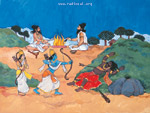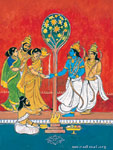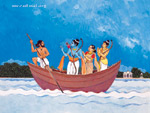|
The Rama Story
The Rama Avatar
is the first of the three great Avatars.
Thousands of years ago, the Lord took birth in Ayodhya as
the eldest son of Emperor Dasaratha, choosing the Emperor’s
senior-most wife Kausalya as His mother. Aspects of Him were
born as His brothers (Lakshmana, Bharata, and Shatrugana)
to the other two wives of Dasaratha.
 When
the Princes were in their teens, Dasaratha sent Rama and Lakshmana
along with Sage Viswamitra to the forest, to guard from demons
the sacred rituals then being performed by the Sage. Later
in the court of Emperor Janaka, Rama lifted the mighty bow
of Siva, winning thereby the hand of Sita, the foster daughter
of Janaka. Along with the wedding of Rama and Sita, the marriages
of the other Princes were also celebrated. When
the Princes were in their teens, Dasaratha sent Rama and Lakshmana
along with Sage Viswamitra to the forest, to guard from demons
the sacred rituals then being performed by the Sage. Later
in the court of Emperor Janaka, Rama lifted the mighty bow
of Siva, winning thereby the hand of Sita, the foster daughter
of Janaka. Along with the wedding of Rama and Sita, the marriages
of the other Princes were also celebrated.
Years later, Dasaratha decided to step down and crown Rama
as the Emperor. But just hours before the auspicious ceremony,
Kaikeyi the third wife of Dasaratha cashed an old promise
given to her, and made Dasaratha banish Rama to the forest
for fourteen years, while her own son Bharata was nominated
to the throne.
Bharatha the surprise beneficiary was unaware of the scheming
of his mother, as he was then in his grandfather’s kingdom.
Rama happily obeyed His father, and at once left for the forest,
with Sita and Lakshmana accompanying Him.
 Unable
to bear the separation from Rama, Dasaratha breathed his last
and Bharatha was immediately sent for. He hastened back to
learn that his father had died of grief and that his dear
Brother had been banished to the forest, all for his sake!
Bharatha refused to ascend the throne, rushed to the forest,
and pleaded with Rama to return and rule. But Rama was firm
in standing by His word given to His father and step-mother.
Bharatha returned disappointed, donned the garb of a hermit,
lived in a village, and administered the kingdom on behalf
of Rama, symbolically deriving authority from the sandals
of Rama, reverentially placed on the throne. Unable
to bear the separation from Rama, Dasaratha breathed his last
and Bharatha was immediately sent for. He hastened back to
learn that his father had died of grief and that his dear
Brother had been banished to the forest, all for his sake!
Bharatha refused to ascend the throne, rushed to the forest,
and pleaded with Rama to return and rule. But Rama was firm
in standing by His word given to His father and step-mother.
Bharatha returned disappointed, donned the garb of a hermit,
lived in a village, and administered the kingdom on behalf
of Rama, symbolically deriving authority from the sandals
of Rama, reverentially placed on the throne.
After Bharatha’s departure, Rama, along with Sita
and Lakshmana withdrew deep into the forest. There one day,
Sita was abducted by Ravana, the evil ruler of Lanka, even
as Rama was engaged in capturing for Sita, a golden deer.
Rama and Lakshmana then began their long arduous search
for Sita. In the process, they befriended Sugriva, the Vanara
(monkey) leader. Hanuman, a minister of Sugriva, became a
great devotee of Rama. Sugriva offered help in the search
for Sita. As a part of the process, Hanuman jumped across
the ocean to the island of Lanka, and there located Sita held
captive by Ravana in a garden.
 Rama
then invaded Lanka along with the Vanara warriors, building
a bridge across the ocean for the purpose of crossing it.
A lengthy battle ensued at the end of which all the evil doers
perished, including Ravana, who was slain by Rama. Sita was
rescued, and Rama, Lakhsmana and Sita triumphantly returned
to the mainland, flying in the very same aerial chariot of
Ravana in which Sita was earlier carried away. After reunion
with Bharata who was counting the days, the entire party entered
Ayodhya, much to the joy of the people. Rama
then invaded Lanka along with the Vanara warriors, building
a bridge across the ocean for the purpose of crossing it.
A lengthy battle ensued at the end of which all the evil doers
perished, including Ravana, who was slain by Rama. Sita was
rescued, and Rama, Lakhsmana and Sita triumphantly returned
to the mainland, flying in the very same aerial chariot of
Ravana in which Sita was earlier carried away. After reunion
with Bharata who was counting the days, the entire party entered
Ayodhya, much to the joy of the people.
The exile having been duly completed, on
an auspicious day Rama was duly crowned, a ceremony that had
to wait for fourteen years because the Avatar
had a promise to keep. Rama ruled righteously for several
years. His reign is symbolic of peace, prosperity and justice,
and even today is held up as a model for governance.
Rama was God Incarnate, but He never proclaimed
His Divinity. In every respect, His life was an emphatic message
of how one ought to live, always adhering to Sathya
and Dharma. Rama was an ideal
son, an ideal brother, an ideal friend, an ideal master, and
an ideal King.
The Rama Avatar
proves that the one who protects Dharma
and stands by it, will himself be protected by that very same
Dharma.
The accompanying paintings have been done
in the traditional Karnataka style.
|